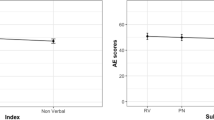Abstract
Patterns of intellectual ability were examined in 81 children with verbal deficits identified by a Low Verbal/High Performance WISC profile. The results of verbal and nonverbal tests of intellectual functioning were factor-analyzed, and three groups of children were defined based on patterns of factor scores. Group 1 consisted of children with a Specific Language Disability (SLD) but good Abstract Reasoning ability, while Group 2 included SLD children with good Sequencing-Memory skills. Group 3 children displayed a General Language Disability (GLD) with deficits in both abstract reasoning and sequencing memory. The intellectual patterns were related to cognitive interpretations and found to have educational implications, with Group 1 children reading adequately, Group 2 children showing somewhat poorer reading skills, and Group 3 children reading very poorly. These findings emphasize the importance of identifying subgroups of children with verbal deficits and demonstrate the feasibility of extracting relatively specific cognitive information from global measures of intelligence. The results question the appropriateness of applying traditional assumptions regarding cognitive organization derived from studies of normal children to atypical groups of children.
Similar content being viewed by others
References
Bakker, D. S.Temporal order in disturbed reading. Rotterdam: Rotterdam University Press, 1972.
Bauer, R. H. Memory processes in children with learning disabilities: Evidence for deficient rehearsal.Journal of Experimental Child Psychology, 1977,24, 415–430.
Belmont, L., & Birch, H. G. The intellectual profile of retarded readers.Perceptual and Motor Skills, 1966, 22, 787–816.
Benton, A. L. Dyslexia in relation to form perception and directional sense. In J. Money (Ed.),Reading disability: Progress and research needs in dyslexia. Baltimore: Johns Hopkins Press, 1962.
Benton, A. L. Developmental dyslexia: Neurological aspects. In W. J. Friedlander (Ed.),Advances in Neurology (Vol. 7). New York: Raven Press, 1975.
Boder, E. Developmental dyslexia: A diagnostic approach based on three atypical readingspelling patterns.Developmental Medicine and Child Neurology, 1973,15, 663–687.
Cohen, J. The factorial structure of the WISC at ages 7–6, 10–6, and 13–6.Journal of Consulting Psychology, 1959,23, 285–299.
Corkin, S. Serial-ordering deficits in inferior readers.Neuropsychologia, 1974,12, 347–354.
Das, J. P., Kirby, J. R., & Jarman, R. F. Simultaneous and successive syntheses: An alternative model for cognitive abilities.Psychological Bulletin, 1975,82, 87–103.
Denckla, M., & Rudel, R. Rapid “automatized” naming (R.A.N.): Dyslexia differentiated from other learning disabilities.Neuropsychologia, 1976,14, 471–479.
Fry, M, A., Johnson, C. S., & Muehl, S. Oral language production in relation to reading achievement among select second graders. In D. J. Bakker & P. Satz (Eds.),Specific reading disability. Rotterdam: Rotterdam University Press, 1970.
Gibson, E. J., & Levin, H.The psychology of reading. Cambridge, Massachusetts: M.I.T. Press, 1975.
Guyer, B. L., & Friedman, M. P. Hemispheric processing and cognitive styles in learningdisabled and normal children.Child Development, 1975,46, 658–668.
Hiskey, M. S.Hiskey-Nebraska Test of Learning Aptitude. Lincoln, Nebraska: Union College Press, 1966.
Huelsman, C. B. The WISC subtest syndrome for disabled readers.Perceptual and Motor Skills, 1970,30, 535–550.
Ingram, T. T. S., Mason, A. W., & Blackburn, I. A retrospective study of 82 children with reading disability.Developmental Medicine and Child Neurology, 1970,12, 271–281.
Jastak, J. F., & Jastak, S. R.The Wide Range Achievement Test. Wilmington: Guidance Associates, 1965.
Jensen, A. R. Hierarchical theories of mental ability. In B. Dockrell (Ed.),On intelligence. Toronto: Ontario Institute for Studies in Education, 1970.
Kagan, J. Reflection-impulsivity: The generality and dynamics of conceptual tempo.Journal of Abnormal Psychology, 1966,71, 17–24.
Kaufman, A. S. Factor analysis of the WISC-R at 11 age levels between 6 1/2 and 16 1/2 years.Journal of Consulting and Clinical Psychology, 1975,43, 135–147.
Kirby, J. R., & Das, J. P. Information processing and human abilities.Journal of Educational Psychology, 1978,70, 58–66.
Lyle, J. G., & Goyen, J. Performance of retarded readers on the WISC and educational tests.Journal of Abnormal Psychology, 1969,74, 105–112.
Mattis, S., French, J. H., & Rapin, I. Dyslexia in children and young adults: Three independent neuropsychological syndromes.Developmental Medicine and Child Neurology, 1975,17, 150–163.
Myklebust, H. R. (Ed.).Progress in learning disabilities (Vol. 2). New York: Grune and Stratton, 1971.
Myklebust, H. R., Bannochie, M. N., & Killen, J. R. Learning disabilities and cognitive processes. In H. R. Myklebust (Ed.),Progress in learning disabilities (Vol. 2). New York: Grune and Stratton, 1971.
Nie, N. H., Hull, C. H., Jenkins, J. G., Steinbrenner, K., & Bent, D. H.Statistical package for the social sciences (2nd ed.). New York: McGraw-Hill, 1975.
Reed, J. C. Reading achievement as related to differences between WISC Verbal and Performance IQs.Child Development, 1967,38, 835–840.
Satz, P., & Van Nostrand, G. K. Developmental dyslexia: An evaluation of a theory. In P. Satz & J. Ross (Eds.),The disabled learner. Rotterdam: Rotterdam University Press, 1973.
Shankweiler, D., & Liberman, I. Y. Exploring the relations between reading and speech. In R. M. Knights & D. J. Bakker (Eds.),The neuropsychology of learning disorders: Theoretical approaches. Baltimore: University Park Press, 1976.
Swanson, H. L. Nonverbal visual short-term memory as a function of age and dimensionality in learning-disabled children.Child Development, 1911, 48, 51–55.
Torgesen, J. K. Memorization processes in reading-disabled children.Journal of Educational Psychology, 1977,69, 571–578.
Vellutino, F. R. Alternative conceptualizations of dyslexia: Evidence in support of a verbaldeficit hypothesis.Harvard Educational Review, 1977,47, 334–354.
Vellutino, F. R., Smith, H., Steger, J. A., & Kaman, M. Reading disability: Age differences and the perceptual deficit hypothesis.Child Development, 1975,46, 487–493.
Wallbrown, F. H., Blaha, J., Wherry, R. J., & Counts, D.H. An empirical test of Myklebust's cognitive structure hypotheses for 70 reading-disabled children.Journal of Consulting and Clinical Psychology, 1974,42, 211–218.
Warrington, E. K. The incidence of verbal disability associated with reading retardation.Neuropsychologia, 1967,5, 175–179.
Wechsler, D.Wechsler Intelligence Scale for Children. New York: Psychological Corporation, 1949.
Author information
Authors and Affiliations
Rights and permissions
About this article
Cite this article
Richman, L.C., Lindgren, S.D. Patterns of intellectual ability in children with verbal deficits. J Abnorm Child Psychol 8, 65–81 (1980). https://doi.org/10.1007/BF00918162
Issue Date:
DOI: https://doi.org/10.1007/BF00918162




